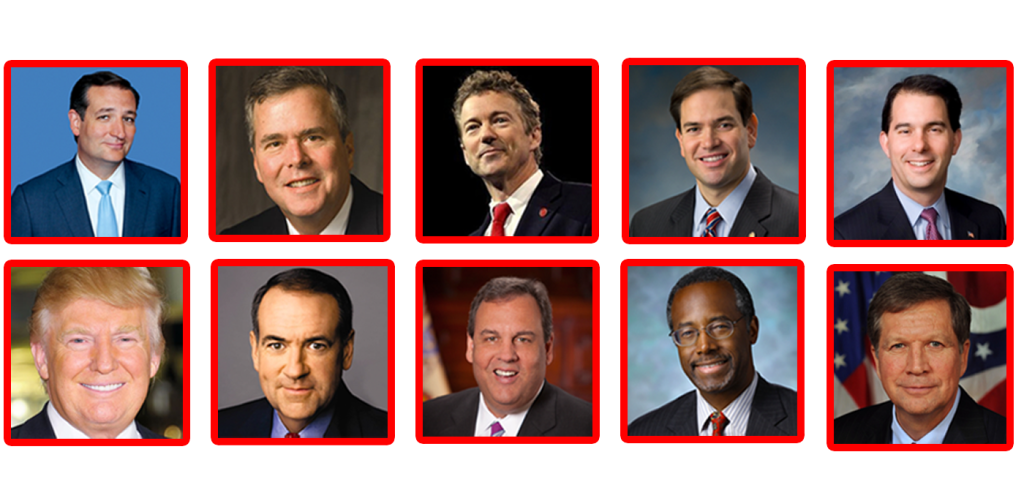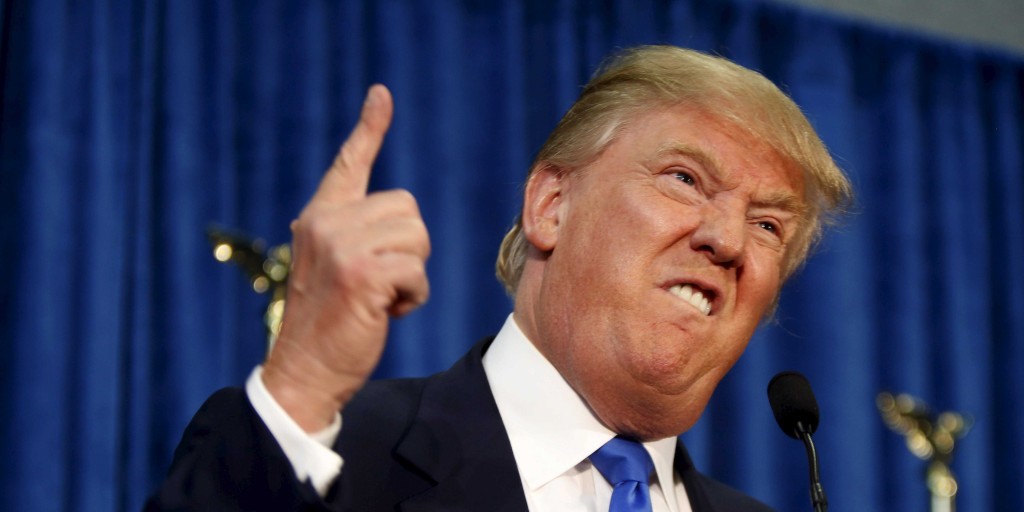Presidential TV ad roundup: Debate day edition – August 6

Earlier this week, Fox News set the line-up for the first Republican presidential debate of the election season. In just a few hours, real estate mogul Donald Trump; former Florida Gov. Jeb Bush; Wisconsin Gov. Scott Walker; former Arkansas Gov. Mike Huckabee; retired neurosurgeon Ben Carson; Texas Sen. Ted Cruz; Florida Sen. Marco Rubio; Kentucky Sen. Rand Paul; New Jersey Gov. Chris Christie; and Ohio Gov. John Kasich will square-off center stage in Cleveland, OH as they make their cases for the Republican nomination. Leading up to the debate, several candidates on both side of the aisle have taken to the airwaves with their messages in hopes of reaching voters before tonight’s primetime showdown. Here’s what the candidates are saying this week: Jeb Bush Title: The power of Christianity Published: August 4, 2015 Tone: Uplifting and committed Chris Christie Title: Secretary Clinton, Answer The Question Published: August 4, 2015 Tone: Feisty Bobby Jindal Title: Evolved again Published: August 5, 2015 Tone: N/A Rand Paul Title: #StandWithRand: The First Debate Published: August 5, 2015 Tone: Determined Hillary Clinton Title: Hillary Clinton: Support and Stand with Planned Parenthood Published: August 3, 2015 Tone: Heavy and frustrated Be sure to check back, as we will continue to add videos as they come in leading up to the debate.
GOP debate lineup: Trump and Bush in, Fiorina and Perry out

Ten candidates have made the cut for the first Republican presidential debate Thursday, with polling front-runner Donald Trump hoping for a civil evening but ready to pounce if attacked. The seven others lagging in the polls and relegated to an afternoon forum? Call them the not-ready-for-prime-time players, at least in the eyes of debate organizers. Sharing the Cleveland stage with the billionaire businessman will be former Florida Gov. Jeb Bush, Wisconsin Gov. Scott Walker, Texas Sen. Ted Cruz, Kentucky Sen. Rand Paul, Florida Sen. Marco Rubio, retired neurosurgeon Ben Carson, former Arkansas Gov. Mike Huckabee, New Jersey Gov. Chris Christie and Ohio Gov. John Kasich. Candidates with time to watch that debate are former tech executive Carly Fiorina, former Texas Gov. Rick Perry, Louisiana Gov. Bobby Jindal, South Carolina Sen. Lindsey Graham, former Pennsylvania Sen. Rick Santorum, former New York Gov. George Pataki and former Virginia Gov. Jim Gilmore. The largest field of contenders in modern memory challenged debate organizers. Fox News relied on an average of five national polls to decide the lineups for the prime-time debate and the forum four hours earlier. “We never ever envisioned we’d have 17 major candidates,” said Steve Duprey, New Hampshire’s representative to the Republican National Committee who helped craft the debate plan. “There’s no perfect solution.” Republican officials were particularly concerned about Fiorina’s status, hoping she would help balance Democratic front-runner Hillary Rodham Clinton‘s push to rally women. Trump’s recent surge in the polls, a surprise to many Republican officials, damaged Fiorina’s chances. Some Republicans fear that Trump’s rhetoric on immigration and other issues could hurt the party. “I probably am the target,” he said Wednesday on ABC’s “Good Morning America.” He said he did not want to attack any of his rivals and preferred to “just discuss the issues” in the course of a “very civil” debate. Still, he made clear that if attacked, he would have “to do something back.” Trump was far and away the front-runner in the five most recent national polls that determined the debate lineup. Several candidates were grouped together in the single digits, most separated by a number smaller than the margin of error. For example, in a Monmouth University survey released Monday, Kasich was the 10th candidate with the support of 3.2 percent of voters. But after taking the margin of error into account, Monmouth noted that Kasich’s support could be as low as 1.5 percent, while almost any of the candidates who polled lower could be that high or higher. Five more party-sanctioned debates are scheduled before primary voting begins in February. “This first debate is just one opportunity of many,” Amy Frederick, an aide to Fiorina, wrote supporters. “With many more debates to come, we fully expect that Carly will soon stand on the stage and show America what real leadership looks like.” Jindal spokeswoman Shannon Dirmann issued a challenge of sorts: “The governor will debate anyone anywhere at any time.” Candidates already began to turn their attention toward Trump. Asked about Trump while courting religious conservatives on Tuesday, Bush said the businessman’s rhetoric on immigrants is “wrong.” `’We have a different tone and a different view,” he said. “I respect the fact that he’s the front-runner for the Republican nomination,” Bush continued. “This is a serious thing. But I think to win and govern the right way – we have to unite rather than divide.” Republished with permission of The Associated Press.
Overflowing GOP presidential field has Fox News in demand

It’s the stuff of Republican nightmares: Fox News runs out of advertising time. But in an election bursting with money from an expected 17 Republican presidential candidates and dozens of outside groups supporting them, NCC Media, the company that handles placement of political ads for most of the country’s cable systems, is already working out the puzzle of how to accommodate everyone. “Fox is a revenue driver,” said Tim Kay, NCC’s director of political strategy. “It’s extremely popular as the way to reach Republican primary voters.” He added: “What we’re waiting to see is, is everyone going to want Fox News, or are they branching out to different channels to try to capture some of those same demographics?” It’s not just Fox News. Broadcast stations in the early primary voting states of Iowa, New Hampshire, South Carolina and Nevada are preparing for a 2016 onslaught — which they welcome, because presidential ads boost their bottom lines every four years. For television viewers? Welcome back to campaign season. If you live in New Hampshire or Iowa, you’re already seeing the smiling faces of at least four Republican presidential candidates. Beginning Thursday, Ohio Gov. John Kasich will be talking in a commercial about how he learned from his father, “Do your best to look out for other people.” The ad, which costs about $1 million to broadcast across New Hampshire, was paid for by New Day for America, an outside group backing the governor, who has yet to make his candidacy official. Ex-Texas Gov. Rick Perry and Louisiana Gov. Bobby Jindal, both declared GOP presidential candidates, have been introducing themselves to Iowans thanks to ads put up by outside groups helping them. Texas Sen. Ted Cruz‘s campaign put a small run of commercials on the air soon after he announced his candidacy in late March. All of this with the nation’s first primary contest, in Iowa, more than 200 days away. Still, early advertising gets the candidates better known and can help presidential aspirants who are struggling near the bottom of the pack, said Will Feltus, a media researcher and planner at National Media who worked on George W. Bush‘s two presidential elections. “There’s a perception that you’re not real until you’re on television,” Feltus said. “TV has a very positive effect on supporters, on donors and on potential donors.” No one in the 2016 GOP class has focused on TV more than Florida Sen. Marco Rubio, whose campaign has placed orders for more than $12 million in ads that would start at the end of this year and air in Iowa, New Hampshire and other early primary states. “We raise money for one simple reason,” Rubio told The Associated Press while campaigning Wednesday in Iowa. “And that is to be able to pay for an organization that can deliver our message, and also be able to buy access and airtime to be able to communicate with voters.” Rubio is also getting a TV assist from a nonprofit policy group that keeps its donors secret. Conservative Solutions Project spent more than $3 million on commercials on national cable. Its ad focuses on the “bad deal” that President Barack Obama‘s administration is negotiating with Iran on nuclear weapons. “Sen. Marco Rubio is fighting to stop it,” the narrator says. It’s on — you guessed it — Fox News. The news outlet sucks up more political advertising spots than any other channel, NCC data show, and Republican primary elections drive that tally. CNN follows, then NBC, CBS and ABC. A study by the Pew Research Center helps to illustrate why: It found that 47 percent of conservatives consider Fox News their main and only news source, and 88 percent of them trust it. While three-fourth of all political commercials in the last presidential election were on cable, broadcast reaches far more viewers and accounts for the majority of the estimated $3 billion that political candidates and groups, from the president down to town sheriff, spent on ads in 2012. The political interest in cable ballooned in popularity after Obama’s 2008 campaign used viewership data to reach small groups of voters in critical locations — for example, college kids watching MTV at night in Columbus, Ohio. “Cable fits with the overall trend of campaigns to target particular kinds of voters,” said Travis Ridout, a co-director of the Wesleyan Media Project, which analyzes election advertising, including the $3 billion in 2012 spending. But unlike local news broadcasts with their bounty of advertising time available to politicians, cable offers just a couple of minutes per hour for those seeking to pipe an election message to a specific geographic location. “There’s only one problem,” Ridout said. “There’s not enough to go around.” Republished with permission of The Associated Press.
As Republican infighting grows, donors call for calm

Worried about “Republican on Republican violence,” top party donors are taking action, with one firing off a letter calling for more civility and another seeking to block businessman Donald Trump from the debate stage altogether. Foster Friess, a Wyoming-based investor and one of the party’s top 20 donors in the last presidential contest, issued a letter to 16 White House prospects and the Republican National Committee late last week calling for candidates to stay on the “civility reservation.” “Our candidates will benefit if they all submit to Ronald Reagan‘s 11th Commandment, `Thou shall not speak ill of a fellow Republican,’” Friess wrote in a copy of the letter sent to Republican National Committee chairman Reince Priebus and obtained by The Associated Press. In the dispatch, Friess cites the backing of casino magnate Sheldon Adelson and Chicago Cubs co-owner Todd Ricketts. “Would you join the effort to inspire a more civil way of making their points?” Friess wrote. “If they drift off the `civility reservation,’ let’s all immediately communicate that to them.” The call for calm comes as the sprawling Republican field shows signs it could tip into a bare-knuckles struggle for the nomination — a scenario that the party’s elite donors see as a distressing echo of four years ago. New Jersey Gov. Chris Christie on Monday charged that Republicans don’t need Texas Sen. Ted Cruz‘s “lectures.” Wisconsin Gov. Scott Walker repeatedly dismisses Republicans in Congress as doing little. And Kentucky Sen. Rand Paul regularly jabs his Republican opponents by name. Yet no candidate has injected more provocation into the 2016 Republican presidential primary than Trump. While few party officials see the reality television star as a credible candidate, he has lashed out at a growing number of Republican critics who have condemned his recent description of Mexican immigrants as criminals and rapists. Trump over the weekend posted a message from another user on his Twitter account charging that former Florida Gov. Jeb Bush “has to like the Mexican illegals because of his wife,” Columba, who was born in Mexico. Campaigning in New Hampshire over the weekend, Bush said he “absolutely” took the remark personally. Trump has not apologized, but spokeswoman Hope Hicks on Monday said, “This was a retweet from somebody else” about a news story. But Trump stood firm on his comments about immigrants Monday, saying “the Mexican government is forcing their most unwanted people into the United States,” and “criminals, drug dealers, rapists” are among them. He said “many fabulous people” come from Mexico and the U.S. is better for them, but this country is “a dumping ground for Mexico.” Republican donor John Jordan said Monday that GOP leaders should take steps to block Trump’s access to the first presidential debate in early August. Organizers at Fox News, backed by the Republican National Committee, have released guidelines allowing the top 10 candidates in national polling to participate. Trump would qualify under the current terms, while contenders such as Ohio’s two-term Gov. John Kasich would not. “Someone in the party ought to start some sort of petition saying, `If Trump’s going to be on the stage, I’m not going to be on there with him,’” Jordan told AP on Monday. “I’m toying with the idea of it.” “It’s something I feel strongly about as somebody who not only cares about the Republican Party, but also Latinos,” Jordan said. Even as the other candidates say they’re trying to avoid intraparty backbiting, however, they can’t seem to avoid it. In an interview Sunday on NBC’s Meet the Press, Cruz refused to condemn Trump’s comments, saying he’s not going to perpetrate “Republican-on-Republican violence.” Christie, who entered the presidential race last week, wasn’t having it. “I find it ironic, right, that Ted Cruz is giving lectures on Republican-on-Republican violence,” Christie said on Fox News, accusing the Texan of sponsoring hardball ads against Republican Sen. Lamar Alexander in 2014 primaries. “I mean, all due respect, I don’t need to be lectured by Ted Cruz.” The Republican National Committee has dramatically reduced the number of primary debates before the 2016 contest largely to avoid the kind of attacks that bloodied their 2012 nominee, Mitt Romney. As the last GOP nomination heated up in January 2012, Romney and former House Speaker Newt Gingrich got particularly nasty. Gingrich joined Obama supporters in attacking Romney’s business background, calling him a “vulture capitalist.” Donors remember those exchanges well and fear a repeat of primary vitriol would lead to another general election loss. “Ninety-nine percent of leading donors saw the candidates carve each other up in the 2012 primaries and come out weaker for it and are determined not to let that happen again,” said Fred Malek, who has helped raise money for GOP presidential candidates for four decades. Responding to Friess’ letter, former Arkansas Gov. Mike Huckabee wrote he plans on “becoming the nominee by playing a better game, not by breaking the legs of my rivals.” “I hope that we don’t commit fratricide again as a party,” Huckabee wrote, according to a copy of his response obtained by AP. Republished with permission of The Associated Press.


